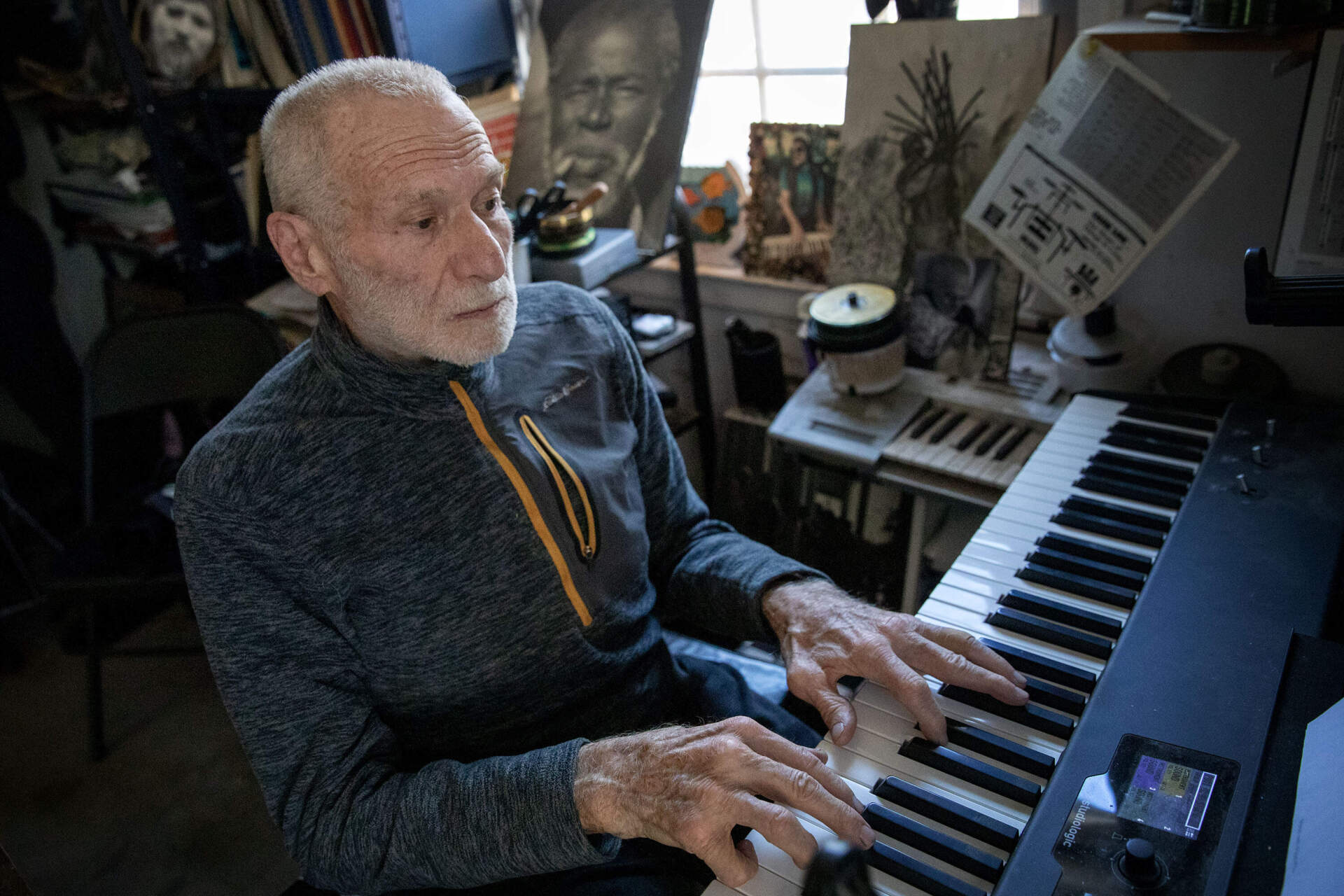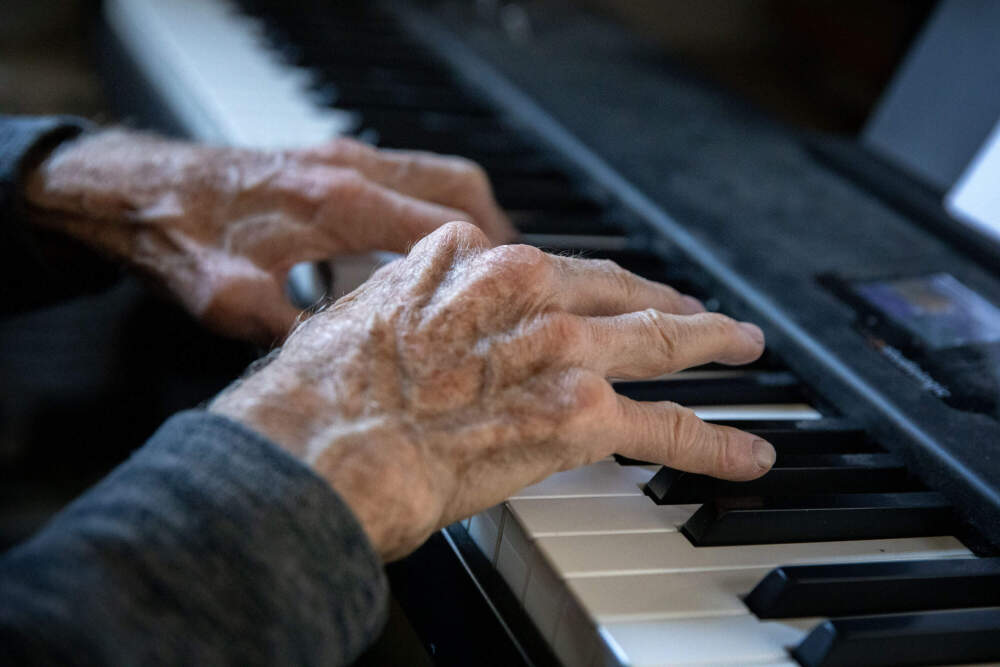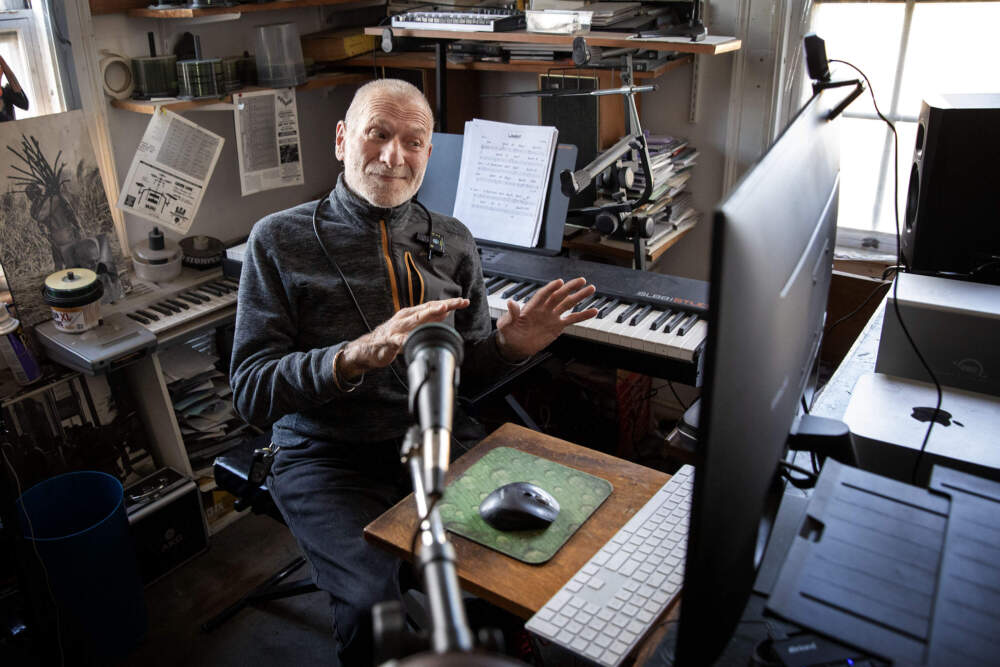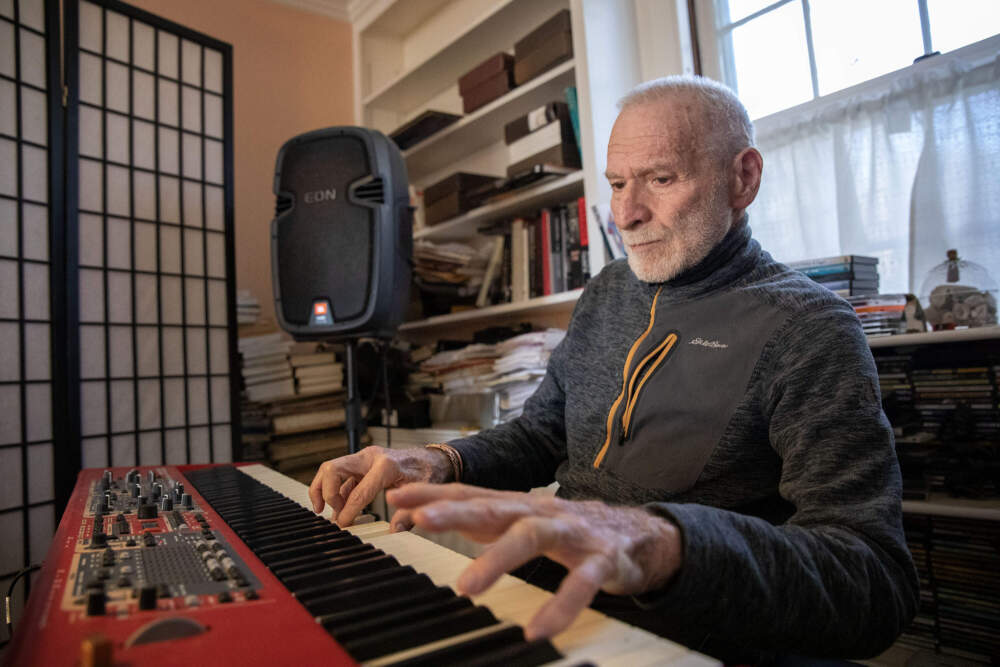Advertisement
Pianist and physician Stanley Sagov grapples with cancer diagnosis as he prepares to perform
Resume
This Saturday night, Dr. Stanley Sagov will do one of his favorite things aside from practicing medicine: play keyboard at the Regattabar in Cambridge with his longtime bandmates.
The acclaimed jazz pianist — also a retired primary care physician — hasn’t performed in public since the pandemic began. And this show is different from his past ones, because he doesn't know if it'll be his last.
Sagov, 79, got a jarring diagnosis two months ago: he has Stage 4 metastatic melanoma in both lungs.
But, so far, the illness isn't slowing him down. He wakes up by 5:30 every morning and hunkers down in a small music room crammed with keyboards, speakers, a computer, records and CDs in his Chestnut Hill home. He composes at least one new song every day, using a computer program with a special mouthpiece to add the sound of instruments including saxophone, clarinet and trombone to his piano playing.
“I just completely trust myself," Sagov said. "I'm going to put my fingers on the keys, and whatever starts, it is going to be where it starts. ... When you're playing, it's the only thing that there is. If you're not thinking it's the only beautiful thing you could be playing at this particular moment, if not you, who? If not now, when?"
Sagov said he approaches his music with the creative intensity he seems to bring to everything in life, including practicing medicine. He pursued the latter as a career after he spent his childhood on the other side of medical care. He was born in South Africa with a genetic deficiency that caused him to have clubfeet and other deformities. He had 16 surgeries by the time he was 13 years old.
Sagov spent more than five decades as a primary care physician, most of that time at Mount Auburn Hospital. He also teaches at Harvard, Boston University and Tufts medical schools.
He spoke with WBUR's All Things Considered host Lisa Mullins about his upcoming jazz performance and how he's preparing for it while confronting a difficult diagnosis.
Interview Highlights
On his love of music, and in particular, jazz:
"I think it paints a picture of a world in which people listen respectfully and with joy and support to other people and do something that they couldn't do without the other person participating. And it doesn't make the world a better place. I'm not naive about the political and economic impacts of artistic expression, although I wish it were true.
"But I think it's an [advertisement] for what's possible. And I think that's what makes people love it and respond to it. Because they can imagine, 'Wow, you could live in a place where someone talks, somebody listens, someone needs a bit more space in case they've something else they want to say.' ... Do you want to add something? Do you want to lift them up? … I think it's what music represents to me and to my players, for sure. We are playing because we love to play with each other.

On how he's coping with his diagnosis:
"I have no bucket list. If I were to have died and not known I had this, I would have missed this conversation. I like living. I don't crave living. I've lived plenty. I'm going to be 80. I've been in most continents, I think. I've done a couple of professions in different places, different ways. … And I've actually had some things I've actually been able to do — make a difference to some people, make a difference to some institutions, make a difference to some [medical] trainees, make a difference to my family. I've been very, very well treated by so many people. I'm incredibly appreciative."
On why he is currently not undergoing cancer treatment:
"Ten years ago, [Stage 4 metastatic melanoma in both lungs] was a ‘kiss-them-nicely-goodbye’ diagnosis. … It's not for some people now. It is still for most.
"I have some advantages, which is more detail than I think I want to focus on now, but enough of them to make me optimistic that I can be monitored at present without treatment. That is pretty unusual and consistent with my physician's advice, my family's acceptance and [a] huge amount of uncertainty.
"But that uncertainty is responsible, and plausible enough that starting treatment early or late with immunotherapy is not known to have any significant effect. It's not taking a chance that maybe everybody would take, but it's absolutely the chance I think that I should take."

On whether, as a doctor, he would give the same advice to himself as a patient.
"Yeah. Here's why. I'm healthy. I'm biologically about 80 but probably [feel] about 60 or so. I exercise every day. I cycle 10, 20 miles. I do yoga. I meditate. I've got a loving, supportive family.
"I could complain. I could complain! And I do. I get miserable. I get terrified. The horror of something growing in me that's not part of me — that biology is not mine and doesn't depend on me.
“Here was my mistake. I was born into the wrong family. My mother died of melanoma. My sister had two melanomas. … Ah, it's my time. It's just my time. That's why, in a way, if I did die tomorrow, that would be OK. But I would miss what I might have done. I mean, that's all.
"Some of the time, I have to allow myself, when I recognize that I'm feeling hopeless, sad, sleepless, immobilized. … I'm a cancer person now. … And that's lonely, sometimes.
"But, the finitude itself — just like a musical sound, you play it, and then it stops. ... Our life, it seems to me, is captured in some way in sound expression.”

On his upcoming performance at the Regattabar:
"[Musician friends] said, ‘Don't talk about your illness a lot. The generosity of the playing and the spirit will say everything you want to say.
"I really want the evening to be about deep feeling. But the feeling is not grim. We are impermanent. ... We have a blip in time. ... I don't know how long I'll be able to be the way I am. So, you know, I'm living with uncertainty. ... And I vote for living as vitally and authentically as I can manage."
This segment aired on December 13, 2023.

